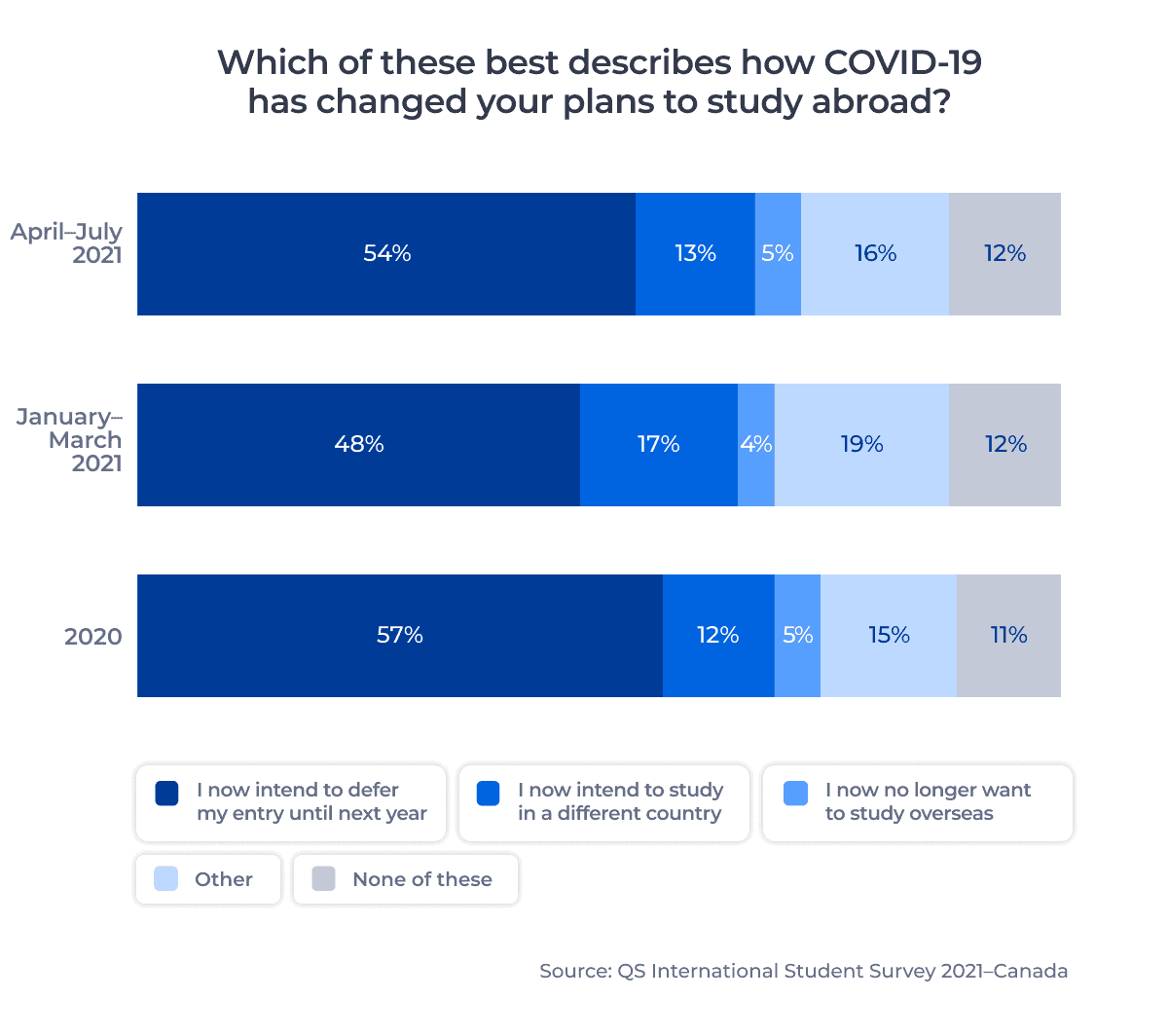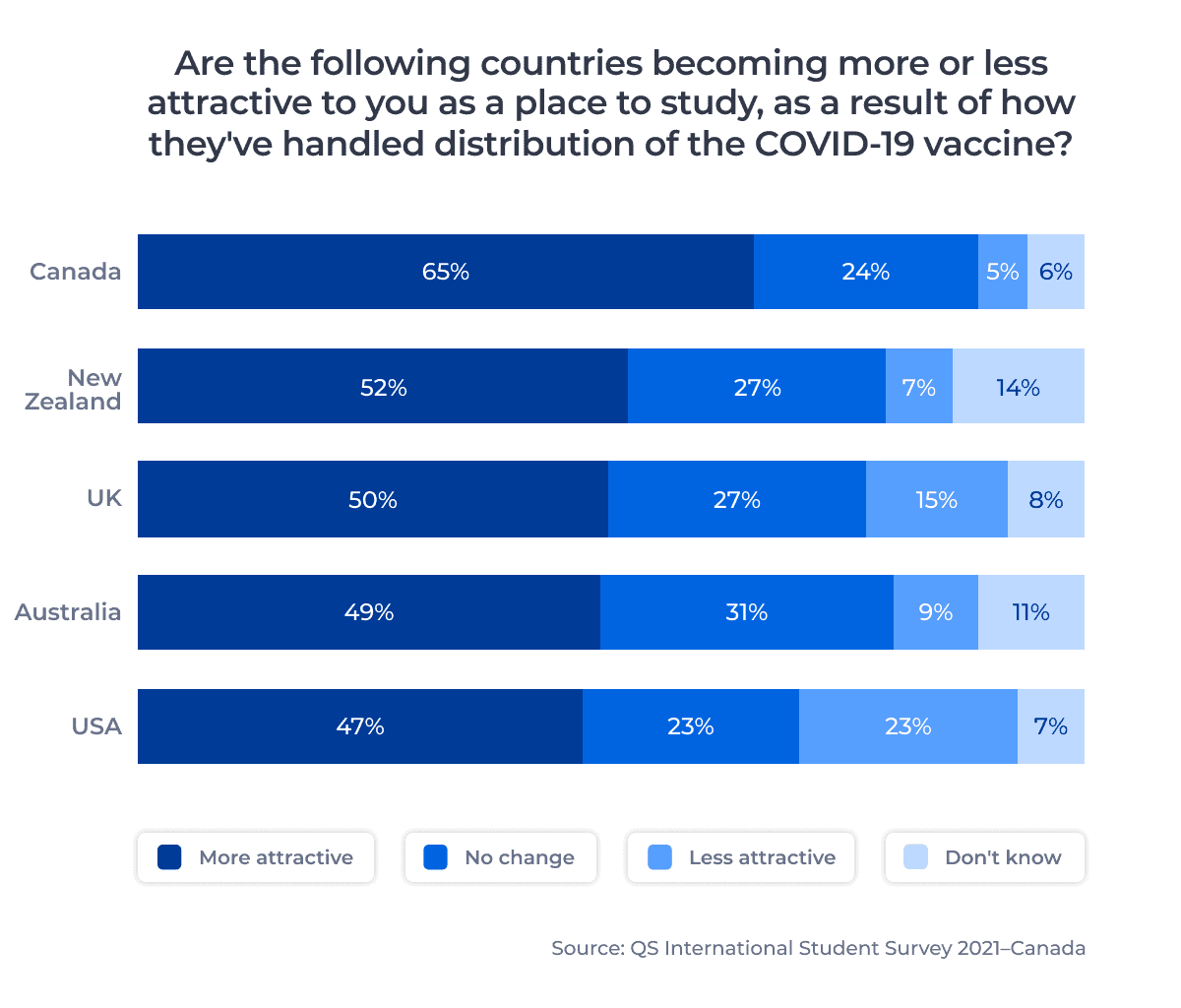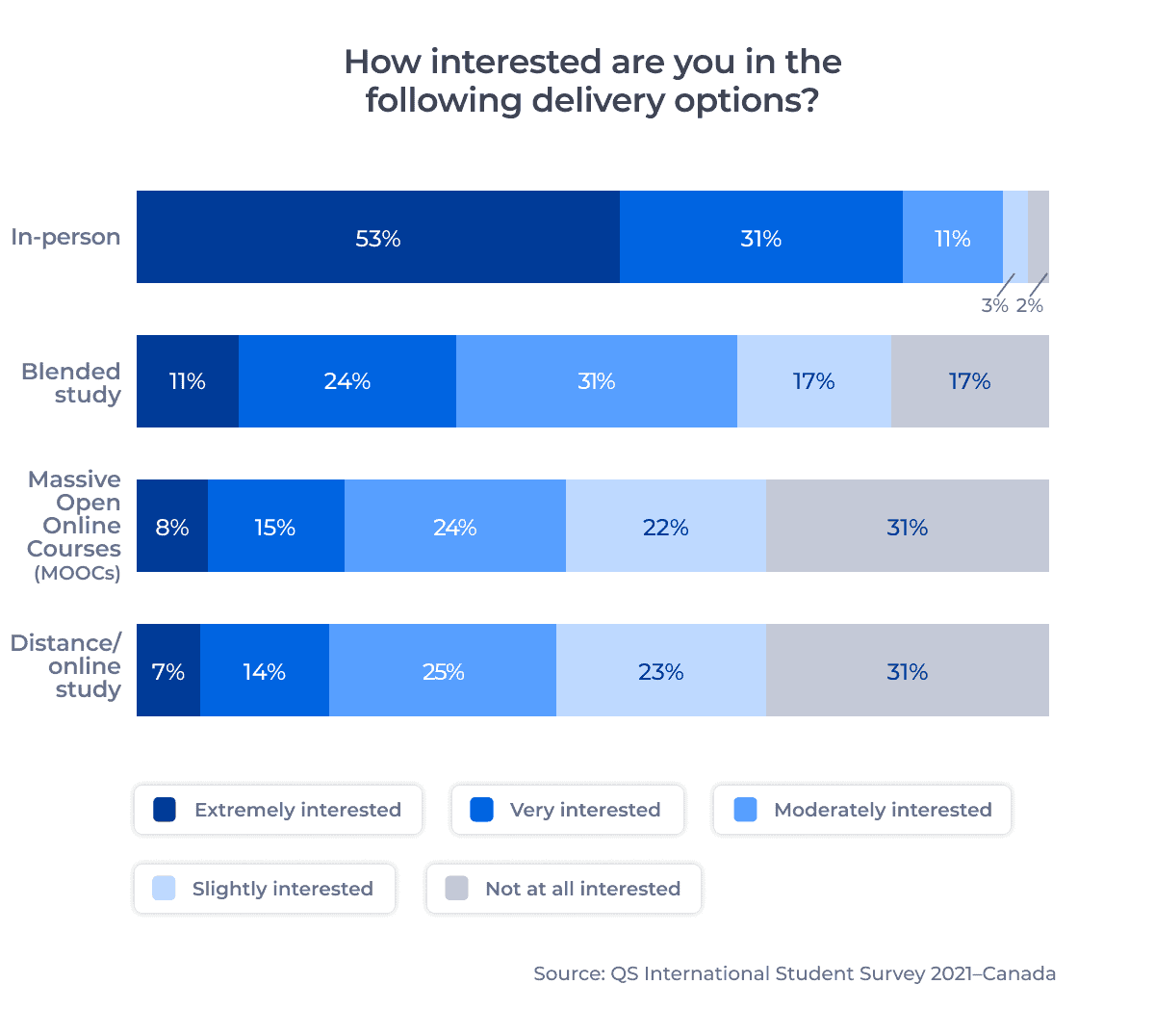The annual QS International Student Survey (ISS) offers valuable insight into what international students want from their study abroad experience. COVID-19 has fundamentally changed what a Canadian university looks like for these students. In the Canadian edition of this year’s ISS, we catch a glimpse of what matters for them right now.
In this ApplyInsights, I’ll be focusing on some of the most impactful findings from the ISS. I’ll highlight how students’ risk profiles have changed, what they need from schools today that they didn’t two years ago, and what they value most when deciding which university to attend.
I’ll also discuss the key role the Canadian government has played in influencing how comfortable students feel about attending school in Canada, and offer my thoughts on what Canadian schools should do to attract more talent.
Key Insights at a Glance
- Canada ranks as the sixth-highest country in the world by share of vaccinated citizens.1
- 65% of students see Canada as a more attractive destination as a result of how it has handled the vaccine rollout, ranking first among top destination markets.
- High-quality teaching is the second-most important factor to prospective Canadian students, right behind affordable tuition.
Navigating an Unfamiliar Decision-Making Process
AI can tell you from first-hand experience that applying to a university or college from a different country has always been a complex and multi-layered process. It’s what drove my brothers and me to start ApplyBoard.
With the addition of a global pandemic, the consideration of how COVID-19 factors into which country, university, and course might be the best fit for students, is now woven into their thought process. 71% of students surveyed between April and July of 2021 said that COVID-19 changed their plans to study abroad.
Vaccine requirements, quarantine concerns, and visa and mobility restrictions are just some of the additional factors prospective students have to consider right now.

Students’ views on whether they should defer their studies for a year, study in a different country, or give up on studying abroad altogether shifted marginally over the past two years. For the most part, students want to wait to pursue their studies until they’re confident it’s safe to do so.
While these are students interested in Canadian schools, I think it’s important to note that vaccine rollouts have been a different experience for every country in the world. Just because Canada has a high number of vaccinated citizens and strongly enforced COVID-19 mandates does not mean that any student is able to go study there.
Canada’s access to international students is going to be contingent on vaccine rollouts in its most popular source markets, not the other way around. Given the recently announced resumption of flights from India to Canada—Canada’s largest source of international students—I’m optimistic that it will be able to welcome back students with less difficulty than other popular study abroad destinations.
While India travel has resumed in the US and the UK, the instability of COVID-19 cases coupled with their respective population’s hesitancy to get vaccinated, make moving there a bigger long-term risk.
The Benefit of Taking Time to Execute Policies
How different populations have responded to their country’s vaccine rollouts and “return to normal” plans directly impacts students’ attraction to them as study destinations. The following chart highlights how students feel about the top five study abroad destinations as a result of how they handled local vaccine distribution:

65% of students see Canada as a more attractive destination as a result of how they’ve handled the vaccine rollout.
Canada has shown a commitment to vaccinating its citizens and implementing safety measures like wearing masks and reducing capacity limits indoors. These are sustainable measures that students clearly do and should feel good about.
Despite taking much longer to acquire and administer vaccines, Canada currently ranks as the sixth-highest country by share of fully vaccinated citizens. The UK and the US sit at 15th and 19th, respectively.2
I’m not certain this positive reception is entirely due to the way in which the Canadian government handled it. A large part of what made the Canadian vaccine rollout work was how receptive Canadians were to getting vaccinated.
Canadians’ acceptance of their country’s vaccination programs and provincial passport systems, has paid dividends in the eyes of prospective students.
Increasing Comfort with Vaccination
Between January and March of 2021, just 65% of students polled by QS said they’d take a COVID-19 vaccine if it was offered to them. When asked the same question three months later, 79% of students were willing to get vaccinated.
Of course, it follows that 21% of prospective students are unsure about or even against vaccination. However, I don’t view this as a problem for Canadian institutions.
65% of students said they thought universities should mandate vaccination for all students, and four in ten students who were skeptical of taking the vaccine said they would consider taking it if required by their universities. As more universities decide to mandate vaccinations for students on campus, I think this could have a positive impact on enrollment numbers.
I recommend schools engage prospective students with resources that help them understand why taking the vaccine is the best decision they can make for themselves and their peers.
Defining High-Quality Teaching
COVID-19 has created new needs for many students considering an education in Canada. Blended learning courses, up-to-date technology, and access to face-to-face sessions with teachers are a few items that the majority of students are asking for.
To me, these things all hinge on the quality of an institution’s teaching staff. 57% of students who were not interested in studying for an online degree expressed concerns about teaching quality.
Teaching students behind a screen is a new environment for teachers to navigate. Delivering content that resonates virtually with students is a tall task, and often doesn’t translate. Pivoting from a lecture hall to their home office is not a natural transition for most professors.
I believe if schools dedicated resources to train their teachers on how to engage students and create an appealing online study atmosphere, it could build student interest in online study.
Learning Outside the Classroom
When it comes to learning online, students are warming up to the idea of delivery options that occur outside the classroom:

I believe there’s potential for schools to generate more interest in remote learning among students, provided they manage the logistics properly.
50% of all international students are pushing back on being required to attend virtual lectures at night due to time zone differences. I believe it’s crucial for universities to either provide recordings of all lectures or run lectures at times that accommodate as many time zones as possible in order to facilitate the best remote learning experience.
Looking Forward
As we hear chatter of countries preparing for a “post-pandemic world,” Canada has taken the appropriate steps to be seen as a safe destination. The Canadian government has rolled out a sustainable strategy looks to be able to keep its citizens safe and socially active, even in the presence of new COVID waves or variants.
Canadian universities should pivot their attention to executing on what has led them to such a favourable position in the eyes of prospective students. Here’s what schools can do to stay ahead of the curve:
- Prioritize protecting students’ physical health through vaccination mandates and widespread health and safety measures on campus, as well as students’ mental health via counselling services and other resources.
- Offer a variety of course delivery methods at competitive tuition rates—ensure these include a mix of in-person, MOOCs, blended study and online learning, that are recorded and offered at times catering to all students.
- Invest resources into training teachers and equipping them with the tools they need to engage their students via online learning methods.
Published: October 5, 2021
Subscribe to ApplyInsights
Sign up for the latest insights on international education.
 Meti Basiri
Meti Basiri
Co-Founder and Chief Marketing Officer (CMO)
Meti is driven by the belief that education is a right, not a privilege. He leads the International Recruitment, Partner Relations, and Marketing teams at ApplyBoard, working to make education accessible to people around the world. Meti has been instrumental in building partnerships with 1,500+ educational institutions across Canada, the United States, the United Kingdom, and Australia. Working with over 7,500 international recruitment partners, ApplyBoard has assisted more than 200,000 students in their study abroad journey. Follow Meti on LinkedIn for more access to ApplyInsights and key industry trends.
FOOTNOTES:
1. Among countries which report the breakdown of doses administered by first and second doses in absolute numbers. Source: Our World in Data.
2. Mathieu, E., Ritchie, H., Ortiz-Ospina, E. et al. A global database of COVID-19 vaccinations. Nat Hum Behav (2021).



